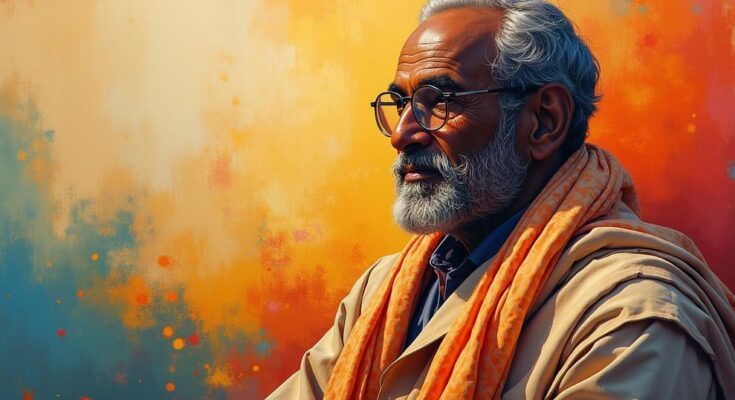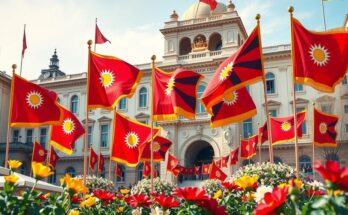A tribute was paid to Professor G.N. Saibaba, who passed away after a long battle with health issues post-imprisonment. A dedicated human rights advocate, Saibaba’s struggles symbolized the fight against oppression and the need for justice. His legacy inspires continued activism against laws like the UAPA, marking a significant moment for students and scholars at Jawaharlal Nehru University.
As dusk painted the sky with shades of orange and purple, a vibrant gathering erupted outside Sabarmati Hostel at Jawaharlal Nehru University. Students, professors, and activists stood united in their solemn tribute to Professor G.N. Saibaba, a beacon for human rights, who passed away on a fateful Saturday night after over 3,500 harrowing days of imprisonment and a recent surgery complication. The air was thick with chants of “Political prisoners ko rihaa karo (Free political prisoners)” and “Inquilab Zindabad (Long live the revolution),” as heartfelt memorials sprang to life among the trees, adorned with photographs and quotes from Saibaba himself. A relentless advocate for Dalit, Adivasi, and disability rights, Saibaba battled a gall bladder ailment and underwent surgery at Nizam’s Institute of Medical Sciences in Hyderabad. Dr. N. Bheerappa, the institute’s director, revealed that despite a promising recovery, underlying health issues resulted in his untimely demise. Paralyzed by polio at a young age, Saibaba’s journey led him to become a prominent voice after relocating to Delhi in 2003. His arrest in 2014, amidst allegations linking him to Maoist groups, sparked a whirlwind of legal battles, culminating in his conviction in 2017. Although a brief glimmer of freedom came in October 2022 from the Bombay High Court, the Supreme Court swiftly reversed this decision, compelling a renewed trial. It wasn’t until March 2024 that Saibaba found solace from imprisonment when the Nagpur Bench of the Bombay High Court acquitted him. Amidst the memorial, Manoranjan Mohanty, a senior human rights scholar, recounted his last visit—an emotional moment just eighteen days prior when he witnessed Saibaba’s resilience wane. “For 10 years, the state treated his body with no respect… he went through torture,” Mohanty expressed, noting the stark reality of Saibaba’s deteriorating health while imprisoned. As the somber tones of remembrance filled the air, Prof. Mohanty passionately urged the crowd to continue Saibaba’s fight against the Unlawful Activities (Prevention) Act, deeming it an oppressive force. “His legacy must continue to be a threat to fascism,” he declared. Professor Apoorvanand, a close confidant of Saibaba, fondly depicted him as a devoted scholar, adored by many. “He wanted his life back,” he recalled. Despite multiple efforts to rehabilitate Saibaba into academic life, the shadow of injustice loomed large. Prof. N. Sachin, who regarded Saibaba as a courageous individual, mirrored these sentiments by holding the state accountable for its unjust treatment, lamenting that, “He was denied humanity.” He shared personal anecdotes that showcased Saibaba’s dedication as a father and a scholar, revealing the profound impact he had on those around him. In their collective sorrow and fervor, the gathered crowd became not just mourners but torchbearers of Saibaba’s message, willing to perpetuate his dream for equality and justice in a world clamoring for reform. Through chants of freedom and justice, the spirit of Professor G.N. Saibaba transcended beyond the realm of mortality. His commitment and unyielding spirit ignited a path for future generations to tread—a legacy entwined with the eternal struggle for human rights, echoing through the corridors of time.
Professor G.N. Saibaba, a notable figure in the fight for human rights, particularly for marginalized communities, spent over a decade imprisoned under serious allegations that many believe were politically motivated. His life story reflects the broader struggles around civil rights, state oppression, and the legal battles that advocates for social justice face in India. His health deteriorated significantly during his imprisonment, raising questions about the treatment of political prisoners in the country. His recent death following surgical complications further fueled discussions on the responsibility of the state in ensuring humane treatment and the ongoing fight against oppressive laws, such as the Unlawful Activities (Prevention) Act.
The memorial for Professor G.N. Saibaba serves as a poignant reminder of his relentless dedication to human rights and social justice. As the gathered students and professors vowed to continue his fight against oppression, Saibaba’s legacy will undoubtedly linger on as a beacon of hope for future activists. His experiences illustrate the critical need for compassion and justice within the legal system, ensuring that the voices of the marginalized are never silenced, even in death.
Original Source: www.thehindu.com



